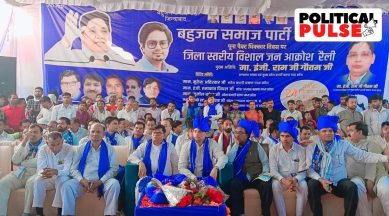A third pole in MP polls? BSP, Gondwana Gantantra Party tie up, eye 37% Dalit, tribal votes
Both the dominant parties, BJP and Congress, brush aside any challenge from the BSP-GGP tie-up, dismissing the possibility that it would eat into their vote share in certain regions in the upcoming Assembly polls

With Madhya Pradesh heading for the Assembly elections in a couple of months, the Bahujan Samaj Party (BSP) and the Gondwana Gantantra Party (GGP) have formed an alliance for the first time ever to contest the polls in a state which has traditionally been dominated by two parties, the Bharatiya Janata Party (BJP) and the Congress.
As per their seat-sharing arrangement for the elections to the 230-member MP Assembly, the BSP will contest 178 constituencies while the GGP will field its candidates in 52 seats.
monthly limit of free stories.
with an Express account.
Formed in 1991, the GGP works for the rights of the Gondi people, a major tribal group in MP, championing the demand for a separate state of Gondwana in the region.
On the BSP-GGP’s electoral alliance, BSP leader and Rajya Sabha member Ramji Gautam said, “For the first time the SC (Scheduled Caste) and ST (Scheduled Tribe) communities in the state will come together. The ST have traditionally voted for two parties (BJP and Congress) and we will offer a strong alternative. We will go to every single village and forest fighting on the plank of rising cases of atrocities against the SC/ST communities. We will also raise the issue of education, healthcare and unemployment, the core issues which plague the two communities.”
Dalits make up about 16 per cent of MP’s population, with 35 of the state’s total 230 Assembly seats reserved for the SCs. In the 2018 Assembly elections, the BJP had won 18 of these seats, with 17 going to the Congress.
Tribals account for over 21 per cent of the state’s population, with 47 Assembly seats reserved for the STs. In the 2018 polls, the BJP could win only 16 of the ST seats as against the Congress’s 30.
The BSP is considered to have support bases in regions bordering Uttar Pradesh, such as the Bundelkhand and the Gwalior-Chambal belt, which have a high concentration of Dalits.
The GGP’s traditional vote base is located in the Mahakaushal region, mainly in the districts of Balaghat, Mandla, Dindori, Seoni, Chhindwara and Betul, which have a notable Gondi population.
Keeping in their sights the 37 per cent combined votes of Dalits and tribals, the BSP-GGP combine are aiming to capture the space of a third front in the upcoming state polls. According to insiders in the BSP-GGP camp, they are especially looking to dent the ruling BJP’s vote share among Dalits and tribals.
The BJP has been trying to woo the SC and ST communities by highlighting its pro-poor image and implementing various welfare schemes for them. The BSP-GGP alliance would attempt to “challenge the BJP’s claim of being the champion of the downtrodden and the marginalised”. Their alliance also hopes to capitalise in “regions that have witnessed several agitations and movements by the Gondi people and Dalits” over the last several years of the BJP government.
The GGP had fielded 61 candidates in the 2003 state polls, of whom three were elected. However, it has since failed to win any seat in the Assembly elections as the party has been beset by factionalism and infighting. It had formed an alliance with the Samajwadi Party (SP) in the 2018 polls, in which the SP managed to win 1 seat.
Recently, the GGP was in the news over a violent confrontation with the police in Umaria after the party activists staged protests alleging corruption in various projects in the district. Over 40 GGP workers were then reportedly arrested and several policemen were injured in the incident.
The BSP, which has been contesting elections in MP since the 1990s, has had a fluctuating electoral performance over the years. The party registered its best results so far in the 2008 polls, when it won 7 seats. In the 2013 polls, the party’s tally declined to 4 seats. In the 2018 polls, it managed to win just 2 seats.
The GGP’s national general secretary Shayam Singh Markam said, “We were always divided and now we have come together on a single platform. We are actively talking to other parties bordering UP to join our alliance. These parties have an OBC leadership and will help us. We will go to the tribal communities and take up the issue of providing 25 per cent of royalties for mining projects in their regions. We will also promise free education and healthcare for the tribal communities.”
Both the BJP and the Congress have brushed aside the BSP-GGP tie-up, dismissing the possibility that it would eat into their vote share in certain regions of the state.
BJP spokesperson Hitesh Bajpai said, “There are only two parties in Madhya Pradesh. We don’t consider the smaller parties (seriously).”
Echoing Bajpai’s views, Congress spokesperson K K Mishra said, “They (BSP-GGP combine) are not a challenge. We are only looking at the BJP as the real challenge and are working to tackle that.”